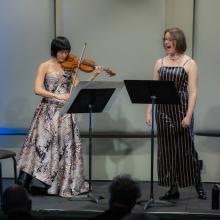A violin concerto for violinist Jennifer Koh that premiered in January 2020 with the Orlando Philharmonic Orchestra.
Inspired by the role of Sanctuary in the lives of American people, including people I know and love, and in Jennifer Koh’s life as well as my own, I undertook a large-scale research project around this powerful word. My task was simple: find instances of the use of “sanctuary” in a broad range of American writings, in order to reach a greater understanding of its layered meaning within American consciousness. I undertook the historical research for the Sanctuary project at the American Antiquarian Society in MA, where I was the William Randolph Hearst Artist Fellow in July 2018. I explored broadsides, poetry, political tracts and speeches, novels and children’s literature – vernacular as well as statesmanlike works – discovering writings that capture the off-hand use of the word in different eras of American history. In all cases, “sanctuary” carries a sense of the inviolable. It is used to appeal to a sense of the absolute. It appears in the rhetoric of both sides of every important American struggle: Abolition, Suffrage, Secession, Manifest Destiny, Temperance, Marriage Rights, Civil Rights, and the foundational thinking of the Founding Fathers. It aims to bypass rational argument and addresses itself directly to sentiment, justice, moral rightness, piety, bigotry, romantic feeling or patriotism.
In the sources I found, sanctuary can denote separate spheres within one’s domain: his study or studio, her virtue, her boudoir, his private correspondence. It can be a safe place, away from bad influences like Drinking, or a “safe” space for debauchery to express itself freely away from corrective influences like women’s company or the Law. Intimacy and love pierce the ‘inner’ sanctuary of the heart and spirit. The White Man’s predations pierce the sanctuary of the Native American’s beloved land. The presence of a loved one can turn a place into a sanctuary for the beloved. People build sanctuaries around their hearts or souls because they have been hurt, and new tenderness or desire can pierce those protective walls. Poetry can be a sanctuary from darker thoughts. Learning that one you love has done evil can make you feel the shame of having the sanctuary of your heart violated.
So many people on our stages and in our audiences are immigrants and refugees. Personal journeys and tribulations also find us urgently seeking new ground. Music provides a sanctuary; through it we create sacredness and refuge for ourselves and for each other.
Centuries in the Hours
A song cycle for blind mezzo-soprano Laurie Rubin featuring an orchestra and personal writings by American women from the 18th through 20th centuries. Premiered by ROCO (River Oaks Chamber Orchestra) in September 2019.
The idea grew out of my residency at the American Antiquarian Society in Worcester, MA. There I began uncovering an entire alternative American history, woven together through the experiences of women from all socioeconomic and ethnic backgrounds, of all ages, from all corners of the US and its nascent territories, and from all chapters of our history. I eventually read 72 diaries, representing staggering diversity. The five women included here are: Emily, a recently divorced and impoverished house cleaner in 1890’s Denver; Betsey, a freed slave who became a missionary and traveled by ship in 1822 from the Northeast to Hawaii, around Cape Horn; Angeles, a brilliant and ambitious Filipina teenager in the 1920’s who moved with her family first to Hawaii and then to Stockton, CA; Sallie, a Civil War-era plantation owner’s daughter near Houston, Texas, who died just a few years after her darkly introspective words were written; and Sarah, a Revolutionary War-era girl whose family fled war-torn Philadelphia to a rural area where she spent many hours hoping for a handsome “military swain” to come by. These women showed me an America that was completely unknown to me, invisible yet fully lived, behind the doors and in the corners, for centuries.

